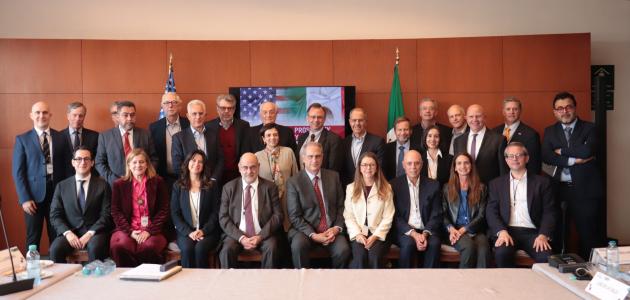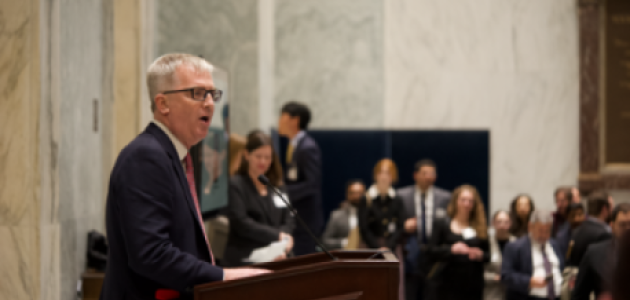A weekly digest of the latest news and research related to the work of the Technology, Economics, and Governance Working Group. Topics covered in the digest include cybersecurity, domestic regulation, innovation, international competition, social media disinformation, and the California exodus.
This week’s edition highlights US military aid to Ukraine, Anonymous’ cyber attacks on Russian websites, US-China talks, and the impact of pricing Saudi oil in yuan instead of dollars. Additionally, new antitrust regulation is introduced on the Hill, Shield Capital raises a fund for dual-use technology, the Pentagon reorganizes data and AI activities, the Belfer Center analyzes North Korean Cyber tactics, digitalization impacts Silicon Valley’s geographic dominance, and DHS assesses extremism from within.
Industrial Policy, International Competition, and Cooperation
Top US and Chinese officials hold high-stakes meeting in Rome | CNN
On Monday, American and Chinese officials met in Rome to discuss efforts to manage US-China competition as well as the security implications of Russia’s invasion of Ukraine. The meeting followed days after reports emerged that Moscow had requested Chinese military assistance in Ukraine, a claim China has denied. Participants included US national security advisor Jake Sullivan and Chinese diplomat Yang Jiechi.
U.S. Adds ‘Kamikaze Drones’ as More Weapons Flow to Ukraine | The New York Times
President Biden announced on Wednesday that the United States would send an additional $800 million of military aid to Ukraine. The assistance package includes small arms and thousands of anti-vehicle weapons. Switchblade drones, originally developed for US Special Operations Command, are also part of the shipment. The drones are small enough to be carried in a backpack and are designed to detonate on impact. According to American and European officials, Ukraine’s partners intend to send more equipment that plays to Ukraine’s strengths—weapons that may be utilized by small teams for ambush attacks are preferred over vehicles that require heavy logistics tails.
Saudi Arabia Considers Accepting Yuan Instead of Dollars for Chinese Oil Sales | The Wall Street Journal
Saudi Arabia is engaged in talks with China to discuss pricing a portion of Chinese oil imports in yuan rather than dollars. Although similar negotiations have persisted for years, President Biden’s criticism of Saudi Arabia’s human rights abuses and China’s burgeoning energy demands have pushed the Kingdom closer to Beijing. If Riyadh approves the pricing change, it would mark the first time that Riyadh trades its oil in a currency other than the US dollar since 1974, when the Nixon administration oversaw an agreement that pegged the dollar as the exclusive currency for Saudi oil transactions. Washington’s ability to print money to finance its budget deficits hinges on the dollar’s status as the dominant international reserve currency, and the end of Saudi cooperation would be a blow to the dollar's supremacy.
Domestic Regulation
Antitrust bill would bar mergers over $5B, allow regulators to unwind others | Ars Technica
On Wednesday, Senator Elizabeth Warren and Representative Mondaire Jones introduced a bill that would block mergers over $5 billion and prevent firms from controlling more than twenty-five percent of a labor market. While antitrust legislation that places restrictions on companies’ share of labor markets is relatively uncommon in the United States, support for this approach has grown as new evidence has emerged establishing links between wage suppression and labor market concentration.
Innovation
Why DoD’s New Approach to Data and Artificial Intelligence Should Enhance National Defense | Council on Foreign Relations
The office of the Chief Digital and AI Officer (CDAO) will succeed and replace the Joint Artificial Intelligence Center (JAIC), according to outgoing Chief Data Officer David Spirk. The Pentagon’s new approach to artificial intelligence will break down silos between data management, analytics, and AI innovation. Officials hope that the change will accelerate the DoD’s adoption of AI technologies by removing administrative barriers that have prevented the Department from sharing data with entities responsible for training AI algorithms.
New venture capital fund focused on high-need, dual-use technology | DefenseNews
Shield Capital, founded by Raj Shah and Philip Bilden, raised over $120 million for a new venture capital fund targeting entrepreneurs developing critical dual-use commercial and defense technology. As many of Shield’s employees are former military officials who have insider knowledge of government contracting processes, the firm offers both valuable counsel and capital to early-stage businesses with products that meet commercial and national security customers’ needs.
Cyber
Anonymous declared a ‘cyber war’ against Russia. Here are the results | CNBC
The hacktivist group Anonymous launched dozens of cyberattacks on Russian websites and databases designed to disrupt Moscow’s government and seed anti-war sentiment. Hackers have leaked thousands of email addresses and sensitive files sourced from Russian federal agencies and utilized distributed denial-of-service attacks to disable the websites of media outlets and other state-run organizations. While many have welcomed Anonymous’ efforts to harm the Russian state, one expert warns that the difficulties of accurately attributing cyberattacks could lead to misdirected escalation.
Cybercriminal Statecraft: North Korean Hackers’ Ties to the Global Underground | The Belfer Center
North Korea has turned to state-sponsored cybercrime to blunt the impact of sanctions and guarantee a steady stream of funds for the regime’s nuclear program. Pyongyang’s illicit activities vary widely in scope, from targeting financial institutions to stealing credit card numbers from consumers of e-commerce sites. North Korean actors have also developed close ties with Russian criminals, which may explain why the Russian-speaking cyber underground has flourished.
California
Has Silicon Valley lost its monopoly over global tech? | The Economist
Accelerated digitalization and the rise of remote work have had complicated effects on Silicon Valley’s reputation as the world’s leading tech hub. Many tech firms have moved out of the Bay Area or established new centers in Austin and New York, and the convenience of virtual pitches has motivated venture capital to increasingly look to Europe for promising investment opportunities. Although Silicon Valley’s geographic advantage has weakened, its expertise and unique business mindset are being exported across the globe.
Freedom of Speech, Domestic Democracy, and Extremism
DHS Releases Report on Internal Review of Domestic Violent Extremism | Department of Homeland Security
The Department of Homeland Security released a report detailing how it should act to prevent, detect, and respond to insider domestic extremist threats. While very few instances of DHS employees engaging in violent extremism were found, officials recommend that the Department better define the indicators of domestic extremism, improve workplace training, implement a centralized case management system to process reports of extremism, and increase funding for insider threat identification initiatives.























